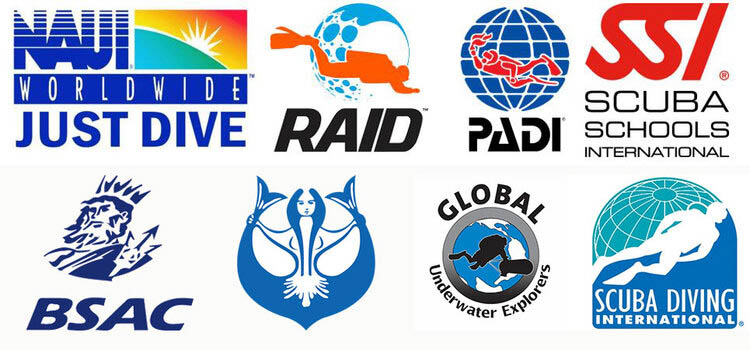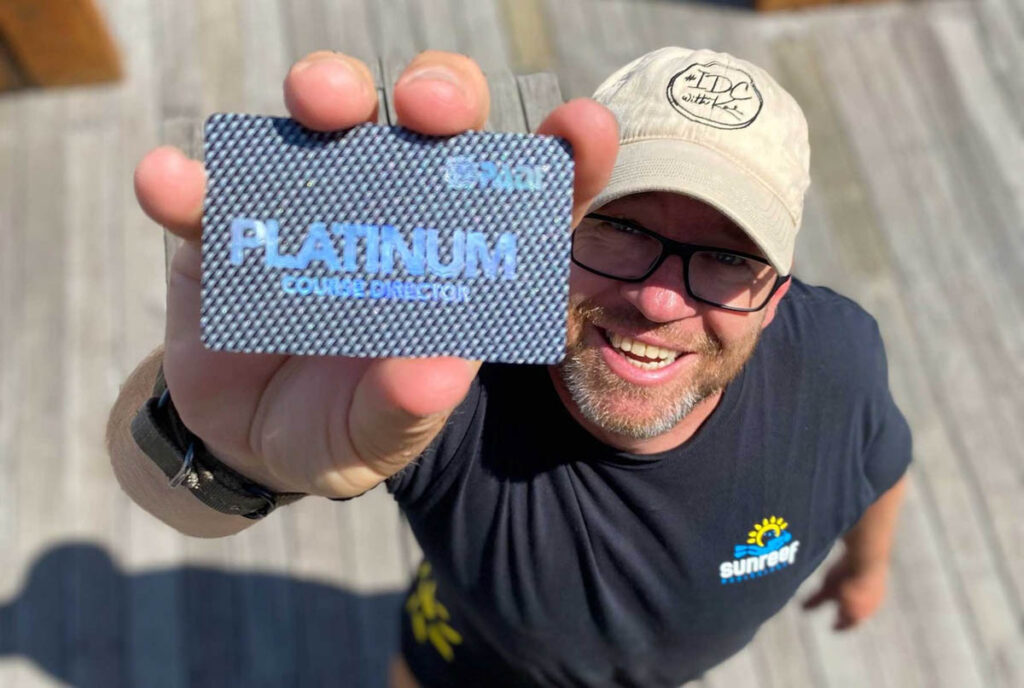First a bit of housekeeping, the views are mine (Kai Steinbeck) and do not represent anyone else and for full disclosure I am a PADI Course Director offering PADI IDC programs in Australia, the Caribbean (Dominican Republic) and South East Asia and yes I would love for you to do your IDC with me. Check my programs out here
With that out of the way let’s have a look at the different training agencies…
To start off with I believe that all training agencies have their advantages and disadvantages, but most importantly there are good instructors from training agency “A” as well as bad instructors. The agency gives the instructor a recognized training system which the instructor must follow and the training agency issues the recognized certification cards so that your students receive proof of training which will allow them to go scuba diving.
At some of the dive companies I have worked at, there is a quality control system in place to ensure that the staff are following all instructional standards and delivering a quality scuba diving course.
I am not going to comment if one training agency’s educational system for recreational divers is better than another, as this is a very subjective. Suffice it to say that by the time you have completed the openwater, advanced, rescue and Divemaster course you should possess the theoretical knowledge and have the diving skills to be comfortable in your instructor development course. During the instructor course you will be taught how to teach, how to find the relevant information on the courses and how to apply the training agencies standards.
So which training agency is better to become a dive instructor? I have listed some of the larger training agencies below (you can click on their names to get you to that training agencies website) This is NOT an extensive list and it would get rather tedious listing them all.
- PADI – Professional Association of Diving Instructors
- SSI – Scuba Schools International
- CMAS – Confederation Mondiale des Activités Subaquatiques
- SDI – Scuba Diving International
- NAUI – National Association of Underwater Instructors
- GUE – Globa Underwater Explorers
- BSAC – British Sub Aqua Club
…. And yes there are others not mentioned here. Didn’t mean to offend anyone….
All of the training agencies have a similar model in the progression of diver education. There is an entry level certification which is then built upon over three or four other courses to reach the first professional level of diver training before going onto becoming a scuba dive instructor. The structure looks something like this:
Entry level (openwater) => Advanced => Rescue => Divemaster / Dive leader => Scuba Dive Instructor
I am writing this article from the view point of being able to find work as a dive instructor in the industry world wide. Whilst there are other training agencies that are emerging and I am sure they have their benefits, there are really only two that can claim a large enough market share that will allow you to easily find work as a scuba dive instructor. These are:
- PADI: Professional Association of Dive Instructors
- SSI: Scuba Schools International.
I know I am probably offending some of the supporters of other organizations and that is not the intent. But purely from a mainstream “I want to travel the world and teach scuba diving” point of view the others just lack the global reach these two training agencies have.
Professional Association of Diving Instructors – PADI
Starting off with the largest and arguably most recognized training agency there is; PADI (Professional Association of Diving Instructors) This agency is by far the largest with the biggest marketing reach and possibly budget. There would be more PADI dive shops world wide in comparison to all other training agencies, which in turn creates a larger demand for PADI dive instructors in comparison to other agencies.
The PADI instructor is able to teach independently, meaning he / she does not have to be tied to a dive shop. You, as a PADI dive instructor, can roll into town and if you can find access to confined water, openwater and dive gear you can teach courses in your own name. This is not the case with some other training agencies… more on that later.
The marketing that PADI does is very good to the point where we see on a regular basis customers coming into dive shops asking: “I want to do my PADI”, rather than asking to do their scuba dive course. PADI’s promotional videos are great and you can see them here on the PADI you tube channel.
The PADI educational system is well put together, easy to follow and a proven system. There is a very good and thorough quality assurance system in place that monitors diver education activity and acts on breaches to the system.
The support to its members is good with regional managers in place world wide which are active in visiting all member dive shops but more importantly are there to assist PADI individual members such as PADI Openwater Scuba Instructors as well. Have a training question? They are there to help you. Have a certifying or administrative question? Again, they are there to help you. Not just the dive school, but you as the individual PADI member.
Scuba Schools International – SSI
As far as recreational scuba diving is concerned they are probably the second largest or popular training agency in the world. The diving course structure is very similar to the PADI one in the sense that the student starts off with an entry level certification, followed by an advanced certification, stress and rescue and then Divemaster
As a SSI instructor you are restricted in the sense that the instructor is not able to teach independently. All training must be conducted through a dive shop. What does that mean? As a SSI instructor I can not roll into town and use the local pool and start teaching scuba courses. All training must go through a dive shop.
Many instructors are dual certified, in the sense that they may hold a PADI instructor certification as well as a SSI one. If this is something you want to do then here is some good advise that will save you $$$. As a PADI instructor you can enrol into a SSI crossover course whereby you do not need to do the whole SSI instructor course again. This is not the case the other way around. If you are a SSI instructor and want to become a PADI instructor you will have to do the whole Openwater Scuba Instructor portion of the IDC including the instructor examinations. There are benefits to holding both ratings in that it opens your employment opportunities more. You have more dive shops to choose from. But remember…. If you want to go down that track, then do your PADI IDC first and then do the cross over to SSI. This will save you considerable money.
Does one agency make better divers than the other. The quick answer to that, in my opinion, is no. All training agencies that I have come across produce good divers and bad divers. Repeating myself from the top now, there are good dive instructors and bad scuba instructors in any training agency. The instructor really makes the course!!!
From a recreational level it does not matter who the diver is certified with. If you want to dive with a PADI dive shop and were certified by a SSI instructor, they will take you diving.
Just like there is no issue with swapping training agencies throughout the training. A diver can start off with an entry level certification of one agency, followed by and advanced with another, the rescue with yet another and their Divemaster with yet another and then enrol into the PADI IDC. This just goes to show that all the training agencies recognize each other and offer very similar scuba courses throughout their curriculum.








